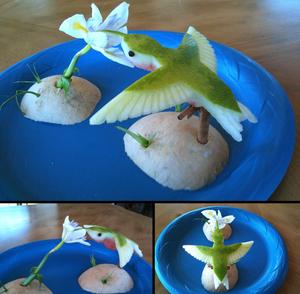ESP Biography
THANH-LIEM HUYNH-TRAN, Stanford Biology Major
|
Major: Biology College/Employer: Stanford Year of Graduation: 2016 |

|
Brief Biographical Sketch:
Thanh-Liem "TL" Huynh-Tran discovered his interest in neuroscience in high school, when he competed in and won the 2011 International Brain Bee Championship (IBBC). He remains active in the IBBC program, and has since staffed the Los Angeles Regional Brain Bee, presented at the Society for Neuroscience's Annual Convention, and founded the Stanford Regional Brain Bee in association with the Stanford Office of Science Outreach. He currently works in the Südhof Lab at the Stanford School of Medicine, studying synapse formation in the developing brain. As a senior graduating with Honors in Biology, he will be attending UCLA David Geffen School of Medicine as a Geffen Scholar next year. In his free time, he enjoys crafting food art (see photo). Past Classes(Clicking a class title will bring you to the course's section of the corresponding course catalog)B4757: Advanced Topics in Neuroscience in Splash Spring 2016 (Apr. 09 - 10, 2016)
So you’ve taken an intro neuro/psych class and know the basics of how your brain works. What’s left to learn? A lot, actually. Heard that information flows from dendrites to the cell body and down the axon to the postsynaptic cell, and not the other way around? Fetuses would die before birth and marijuana wouldn’t be so popular if that were actually true. Each half of the brain controls the opposite side of the body? Nope. Neurons all have axons and dendrites? Lies.
Join us to learn about what was too hard, too mysterious, or too recently discovered to be included your previous neuro classes! In this discussion-based session, students will learn about advanced topics in neuroscience as they are asked to solve some of the most thought-provoking questions of the field. How can memories last a lifetime when the molecules that constitute them are being recycled on a daily basis? Can you design a viable method of mind control (yes, the technology already exists)? How could you deliberately create a false memory, or manipulate existing ones? And finally, the big question: What is consciousness?
B4071: Advanced Topics in Neuroscience: Beyond the Brain Bee in Splash Spring 2015 (Apr. 11 - 12, 2015)
So you’ve taken an intro neuro/psych class and know the basics of how your brain works. What’s left to learn? A lot, actually. Heard that information flows from dendrites to the cell body and down the axon to the postsynaptic cell, and not the other way around? Fetuses would die before birth and marijuana wouldn’t be so popular if that were actually true. Each half of the brain controls the opposite side of the body? Nope. Neurons all have axons and dendrites? Lies.
Join us to learn about what was too hard, too mysterious, or too recently discovered to be included your previous neuro classes! In this discussion-based session, students will learn about advanced topics in neuroscience as they are asked to solve some of the most thought-provoking questions of the field. How can memories last a lifetime when the molecules that constitute them are being recycled on a daily basis? Can you design a viable method of mind control (yes, the technology already exists)? How could you deliberately create a false memory, or manipulate existing ones? And finally, the big question: What is consciousness?
B3804: Introduction to Neuroscience: Preparing for the Brain Bee in Splash Fall 2014 (Nov. 08 - 09, 2014)
This class will begin with a broad overview of neuroscience, starting with the fundamentals of molecular & cellular neurobiology and building up to perception and clinical neurology. Actual material from previous years' Brain Bee contests will be presented as practice questions. The optional second part of the class will introduce more advanced topics in neuroanatomy, neurohistology, MRI/CT reading, and clinical case studies.
*Note: All topics from the Brain Facts booklet, published by the Society for Neuroscience and used by the Regional-level Brain Bees, will be covered. Although prospective Stanford Brain Bee contestants may find this class to be a useful optional review, any student interested in neuroscience is welcome!
|
|
